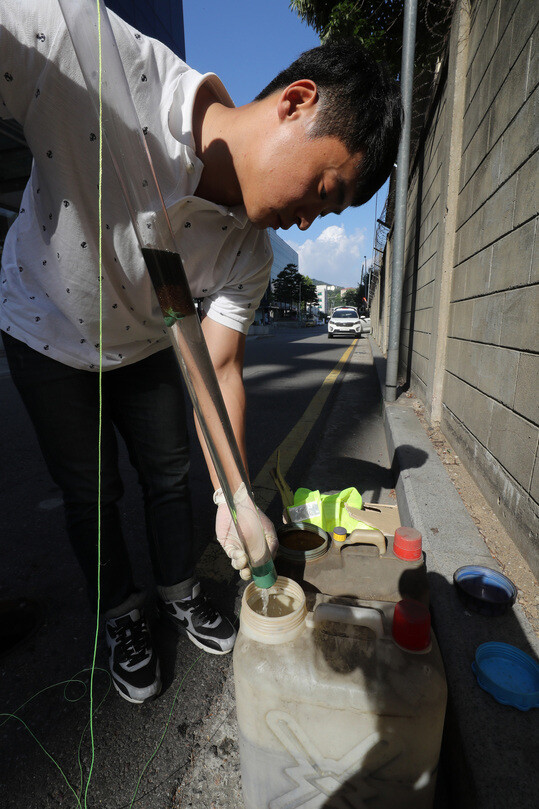hankyoreh
Links to other country sites 다른 나라 사이트 링크
Former US military base sites heavy with contamination

Contamination sources have been detected in six out of ten environmental surveys on former US military bases returned to South Korea. Democratic Party lawmaker and National Assembly National Policy Committee member Park Chan-dae received a Ministry of Environment report on basic environmental studies for USFK-granted areas on Oct. 12 by way of the USFK base relocation support team in the Office for Government Policy Coordination. The report showed a total of 110 environment surveys on returned US bases between 2008 and 2017, with 66 of them confirming soil and/or underground water contamination.
The largest number of contamination sources were detected near Camp Market in Incheon’s Bupyeong district, where total petroleum hydrocarbons (TPH), xylene, copper, lead, zinc, and nickel were found in the ground and TPH and lead in underground water. TPH, toluene, xylene, and ethylbenzene were also detected in the ground near Camp Howes in Paju, Gyeonggi province, along with TPH in underground water.
In some cases, additional surveys uncovered new contamination sources. Studies at Camp Kyle in Uijeongbu and Camp Castle, Camp Casey, and Camp Hovey in Dongducheon showed new sources that had not been discovered during earlier relocation surveys. Many are now questioning whether the previous surveys were not properly conducted.
Over 210 billion won (US$185 million) has been spent to date on US base cleanup efforts, with estimates putting the total at around 1 trillion won (US$883 million) for remediation efforts for additional US bases that are returned.
“It’s time for us to talk about dividing up environmental remediation costs for returned US bases in a way that does not harm the South Korea-US alliance,” Park Chan-dae said.
“The different government agencies need to organize the different claims, establish a consensus, and demand indemnity rights from the US,” he added.
By Choi Hyun-june, staff reporter
Please direct questions or comments to [english@hani.co.kr]

Editorial・opinion
![[Column] Park Geun-hye déjà vu in Yoon Suk-yeol [Column] Park Geun-hye déjà vu in Yoon Suk-yeol](https://flexible.img.hani.co.kr/flexible/normal/500/300/imgdb/original/2024/0424/651713945113788.jpg) [Column] Park Geun-hye déjà vu in Yoon Suk-yeol
[Column] Park Geun-hye déjà vu in Yoon Suk-yeol![[Editorial] New weight of N. Korea’s nuclear threats makes dialogue all the more urgent [Editorial] New weight of N. Korea’s nuclear threats makes dialogue all the more urgent](https://flexible.img.hani.co.kr/flexible/normal/500/300/imgdb/original/2024/0424/7317139454662664.jpg) [Editorial] New weight of N. Korea’s nuclear threats makes dialogue all the more urgent
[Editorial] New weight of N. Korea’s nuclear threats makes dialogue all the more urgent- [Guest essay] The real reason Korea’s new right wants to dub Rhee a founding father
- [Column] ‘Choson’: Is it time we start referring to N. Korea in its own terms?
- [Editorial] Japan’s rewriting of history with Korea has gone too far
- [Column] The president’s questionable capacity for dialogue
- [Column] Are chaebol firms just pizza pies for families to divvy up as they please?
- [Column] Has Korea, too, crossed the Rubicon on China?
- [Correspondent’s column] In Japan’s alliance with US, echoes of its past alliances with UK
- [Editorial] Does Yoon think the Korean public is wrong?
Most viewed articles
- 1[Column] Park Geun-hye déjà vu in Yoon Suk-yeol
- 2[Guest essay] The real reason Korea’s new right wants to dub Rhee a founding father
- 3Why Korea shouldn’t welcome Japan’s newly beefed up defense cooperation with US
- 4[Column] ‘Choson’: Is it time we start referring to N. Korea in its own terms?
- 5Will NewJeans end up collateral damage in internal feud at K-pop juggernaut Hybe?
- 6Senior doctors cut hours, prepare to resign as government refuses to scrap medical reform plan
- 7New AI-based translation tools make their way into everyday life in Korea
- 8Thursday to mark start of resignations by senior doctors amid standoff with government
- 9N. Korean hackers breached 10 defense contractors in South for months, police say
- 10Kim Jong-un expressed ‘satisfaction’ with nuclear counterstrike drill directed at South